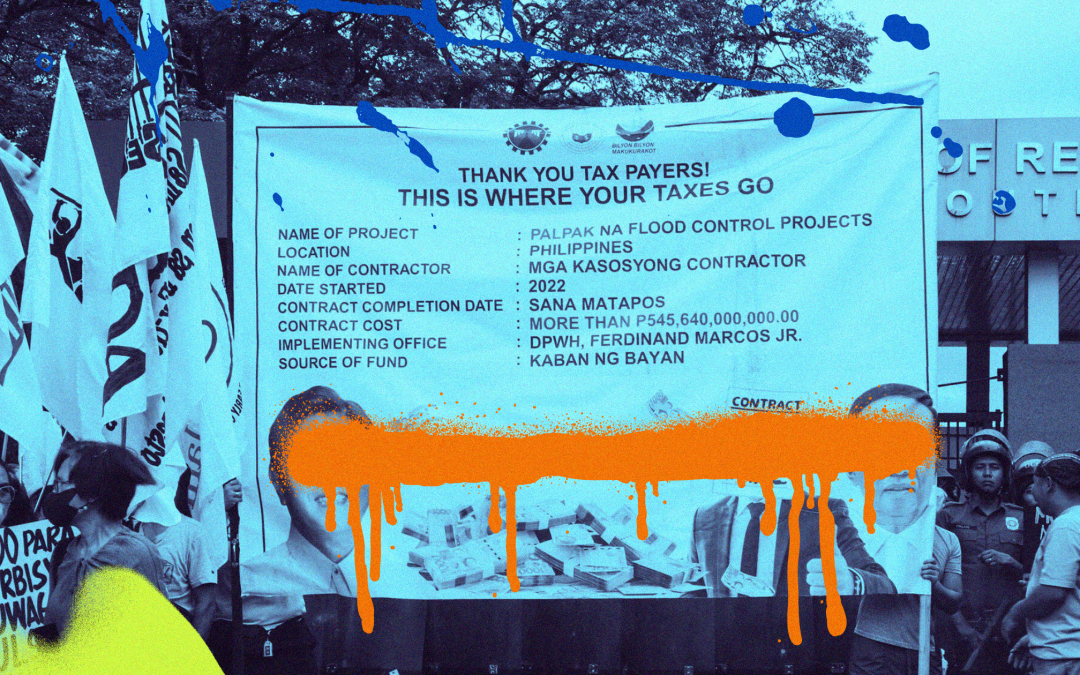The Philippines is struck by an average of 20 tropical cyclones each year, with eight to nine making landfall. Nearly 70% occur between July and October, and at least five are destructive, according to the Asian Disaster Reduction Center. Located in the Pacific Ring of Fire, the country is also highly vulnerable to earthquakes, volcanic eruptions, tsunamis, storm surges, landslides, floods, and droughts. These overlapping risks mean that year after year, Filipinos face deadly floods and landslides, losing lives, homes, and livelihoods.
The Marcos Jr. government on the various weather systems resulting in severe rains and floods hitting the country, “… this is the new normal,” yet this narrative sidesteps accountability. His administration has pushed through over 9,000 flood control projects with an estimated cost of nearly USD 17.16 billion or PHP 980B billion( in just three years—many of them mired in corruption and failure—while advancing profit-driven development plans enabled by multilateral development banks (MDBs) or international financial institutions IFIs). These institutions, together with the government, share responsibility for the resulting devastation faced by communities.
The Reality of Aid–Asia Pacific stands in solidarity with the Filipino people as they confront the failure of the Marcos Jr. government’s flood control projects, marked by corruption, neglect, and mismanagement. We echo the anger of communities whose safety was traded away for profiteering.
This crisis cannot be isolated from broader structural forces. The Philippine’s Department of Public Works and Highways’ (DPWH) infrastructure program is heavily tied to foreign-assisted projects financed by MDBs such as the World Bank, the Asian Development Bank (ADB), and the Japan International Cooperation Agency (JICA). Although presented as “development,” these projects remain structured around debt repayment and profit-making mechanisms that prioritize foreign capital over people’s needs. Such arrangements erode Philippine sovereignty, siphon public resources into debt servicing and consultancy fees, and deny vulnerable communities the comprehensive flood protection they urgently need.
The case of the Flood Risk Management Project in Cagayan de Oro River
Signed in 2015 and completed in 2023, the P8.549 billion project, under a loan agreement with the Japanese government, aimed to mitigate flood risk in the Cagayan de Oro River Basin through the construction of flood protection measures, framed as contributing to “sustainable and stable economic development” in the area. The construction, however, resulted in the dramatic clearing of trees—40% within a 100-meter (330-foot) zone. Residents around the Macajalar Bay told independent media outlet Mongabay that the area had been layered with nipa palms once protected them from the onslaught of Typhoon Washi (with local name Sendong) in 2011. Despite these harms, the DPWH Cagayan de Oro 1st District Engineering Office plans to roll out more flood control projects in 2025, claiming to incorporate lessons from past disasters while continuing to target high-risk areas. This illustrates how debt-financed infrastructure continues to shape flood control efforts in the Philippines.
Complicity in Crisis
ODA-backed infrastructure has entrenched a debt-driven, big-ticket model that prioritizes creditors and investors over people’s needs. Locally-funded projects, meanwhile, mimic this flawed approach with even fewer safeguards, leaving them rife with corruption, inflated costs, and political capture. Both MDBs and the Philippine government share responsibility for development failures that put lives at risk.
The Reality of Aid–Asia Pacific joins the Filipino people in their struggle for climate-resilient infrastructure, genuine accountability, and a development path that serves communities—not foreign creditors, contractors, or corrupt officials. True resilience rests not on debt and corruption, but on people’s sovereignty, solidarity, and collective struggle.
We support the demands of Filipino civil society for accountability from the Marcos Jr. administration, the Department of Public Works and Highways, and international financial institutions. Development actors must stop hiding behind technocratic rhetoric while enabling projects that betray the very people they claim to serve. We call on all development partners to place human rights, social justice, and people-centered development above profit and strategic interests. A democracy that prioritizes debt repayment over people’s welfare, suppresses dissent, and shields corruption is neither just nor sustainable.
Photo by Mayday Multimedia.

